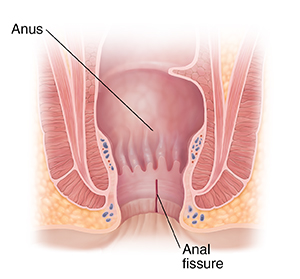An anal fissure is a small rip or tear in the lining of the anus. The anus is the opening where poop (stool or feces) leaves the body.
Anal fissures are common. They are sometimes confused with hemorrhoids, which can cause similar symptoms.
What causes an anal fissure?
Fissures are usually caused by injury to the inner lining of the anus. This may be caused by passing hard stools or frequent loose bowel movements (chronic diarrhea). Having constipation or straining while pooping is the most common cause. You can also get one from:
-
Childbirth.
-
Traumatic anal sex.
Less commonly, a fissure may be caused by:
-
Inflammatory bowel disease.
-
An anal infection.
-
An anal tumor.
-
Sexually transmitted diseases like HIV.
-
Previous anal surgery.
Symptoms of an anal fissure
The main symptom of an anal fissure is sharp pain during a bowel movement. This pain may last a few minutes to hours after. You may also have:
-
Minor bleeding during or after a bowel movement. It could appear as bright red blood on the stool or toilet paper after a bowel movement.
-
Itching or irritation around the anus.
-
A small lump or skin tag on the skin near the anal fissure.
Treatment for an anal fissure
Most anal fissures will get better on their own or with minor treatment. Your health care provider may advise:
-
Changes in your diet. Eating more fiber-filled foods, such as fruits and vegetables. This can help keep your bowel movements regular. It can also make your stool easier to pass. You may talk with a registered dietician to know which foods can help you avoid constipation.
-
Extra fiber. Your provider may also tell you to take a fiber supplement if changes in your diet are not enough. This will help make your stools soft, formed, and bulky.
-
Drinking more water. Getting enough fluids can help prevent getting anal fissures again.
-
Stool softeners or laxatives. These medicines can help prevent constipation.
-
Sitz baths. Soaking in warm water for 10 to 20 minutes a day especially after bowel movements can soothe the area. It helps relax the muscles around the anus. This can help ease symptoms.
-
Medicines. Ointments, creams, and suppositories may help ease pain and aid with healing.
-
Botulinum toxin injections. This treatment may be used if an anal fissure is not healing well. It can help relax the anal sphincter muscles. This may increase blood flow to the area and help healing.
-
Surgery. Your provider may advise surgery if the anal fissure isn’t healing or keeps coming back. You’ll likely have a lateral internal sphincterotomy (LIS). During this procedure, a cut is made in the anal sphincter. This lowers pressure inside the anus and increases blood flow. One possible complication is fecal incontinence. This may include uncontrolled flatus (gas), mild stool leakage, and soiling. But this is temporary and usually gets better. Your provider will suggest the best treatment for you and discuss the risks of surgery.
When to call your health care provider
Call your health care provider right away if:
-
You have a fever of 100.4°F (38°C) or higher, or as directed by your provider.
-
You have ongoing rectal bleeding.
-
Your symptoms don’t get better, or get worse.
-
New symptoms appear.


